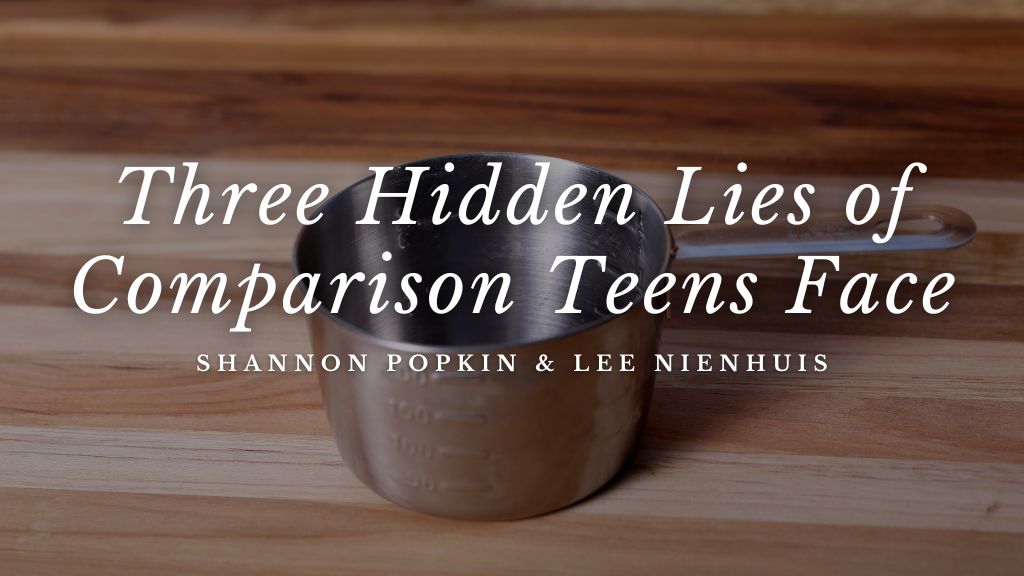Three Hidden Lies of Comparison Teens Face

“Instead of comparing my circumstances with those of others, I need to turn to You and listen as You instruct me, ‘You follow Me!’”
– Jesus Listens,June 24th
Think of your life like a measuring cup—the glass kind with the lines on the side. Inside that cup are all of the things that make your teen girl unique. Her personality, her cute smile, the way she tells a story, her ability to outsmart you in chess, or impress you on the tennis court.
Maybe there was a time when she gave you a toothless grin every time you told her she was the prettiest, cleverest, and most amazing little girl in all the world. But if she’s like most teens, there was a point when her eyes fluttered open to comparison. Her sunny giggle faded, and her carefree grin fell as she began putting her measuring cup next to someone else’s, asking, “How do I measure up?”
So what can you do? How can you help? What can you say to keep her from retreating into dark corners of isolation and insecurity, or driving herself to exhaustion with endless perfectionism?
Comparison is laden with hidden lies, and the best way you can help your teen thrive is by helping her identify those lies and encourage her to embrace the truth. Here are three of comparison’s subtle lies to start with.
Lie #1: Comparison is a game.
Whoever started calling it the “comparison game?” It’s not a game. It’s a strategy the enemy wants to use to destroy your teen’s life. That’s scary, but would you rather your girl not know that someone was stalking her, making plans to attack? Our enemy doesn’t fight fair. He doesn’t wait until a girl is old enough to understand her worth and value. He attacks when she is most vulnerable, luring her into traps of insecurity, shame, perfectionism, jealousy, self-consciousness, and isolation—patterns that can last a lifetime.
James 3:14-15 offers two clues that your teen is listening to wisdom that comes not from heaven, but the world:
- Does she have bitter envy? Does she look over at another girl’s fuller measuring cup with jealousy and scorn?
- Does she have selfish ambition? Is she proud of the ways her cup is fuller? Does she drive herself to prove she has more?
James describes this wisdom as earthly, unspiritual, and demonic (James 3:15). And here is the truth that your teen must know and cling to: She is created by a good God who made her exactly the way she is! She is deeply loved and accepted. She has nothing to prove. The lines on her measuring cup might describe her differences, but they don’t define her or determine her worth. God—her Creator—says she is a treasure, worth sacrificing His Son just so He could snatch her back to safety. So will she listen to these true things God says about her? Will she let His words matter most?
Lie #2: I’m “less than” because she has more.
It’s true that some people have more in their measuring cups and others have less. That’s obvious and your teen knows it. But the enemy tries to leverage this truth by planting doubts, formed into questions such as:
- Why did God give that other teen from church a lovely voice, but not me?
- Why does that girl have parents who stayed together, but not me?
- Why am I the one in a wheelchair, or the one who’s poor, or the one who got Lyme disease?
You see, God doesn’t attach values to differences the way the world does. It’s interesting that when Jesus encountered people who were comparing in all the same ways we do, He would consistently turn the conversation to how things are different in His kingdom than in the world. In Jesus’s kingdom, it doesn’t matter whether your teen has more or less in her cup. A poor girl can still give. A sick girl can still lift up others. A girl who can’t sing can still offer kindness and friendship. In the kingdom, anyone can be great because anyone can serve!
Think of how Jesus modeled greatness. If Jesus had a measuring cup, it would be the biggest and brimming full, yet Jesus didn’t come with puffed up arrogance, insisting everyone bow before Him. To be clear, Jesus didn’t belittle or deny His worth (and your teen shouldn’t either). But He took His measuring cup and humbled Himself by pouring Himself out and serving all of us.
Whether your teen has more or less in her cup, it’s a lie that her worth is tied to these differences. She is loved by God, regardless of how she compares to others. And she can be one His great ones simply by tipping her cup and choosing to serve.
Lie #3 The measure-up girl has more influence.
How does your teen enter a room of people? Before she steps in, does she obsess over what she looks like? Does she enter feeling awkward or shy? Does she draw attention to herself by the way she dresses or how she acts?
The world says that the girl who is confident because of her measuring cup is the one with all the influence, but isn’t she the one fixating on herself? Sure, she glances sideways at the other people in the room, but the question of her heart is, Are my thighs too big? Do I look pretty? Did he notice me? Did I sound smart?
In contrast, imagine a teen who knows she is deeply loved by her Creator just as she was designed to be. Sure, she has more in her measuring cup than some. She also has less than others, but her focus isn’t on her measuring cup’s lines: her focus is on the spout. She enters the room thinking, How can I include the new girl? How can I encourage the football player who broke his leg? How can I make a difference and lift someone up?
That’s the girl with the influence, because this is the girl who is able to lift her chin and see the other people in the room. When a girl tips her measuring cup, the lines on the side become irrelevant. They don’t hold her back anymore.
About The Author

From the platform, page, and podcast mic, Shannon Popkin invites you to drink deeply of God’s story, and live like it’s true. Shannon’s books include Control Girl, Comparison Girl, Comparison Girl for Teens (2024), and Shaped by God’s Promises (2024). Shannon also hosts the Live Like It’s True Bible podcast and has been featured on Revive Our Hearts, FamilyLife Today, The Gospel Coalition, and Proverbs 31. She’s happy to be sharing life with Ken, who makes her laugh every day. Together, they have the joy of watching their three young-adult kids become the amazing people God created them to be. You can connect with Shannon at shannonpopkin.com, or on Instagram, Facebook, or Youtube.
 Lee Nienhuis is an author, speaker, and Bible teacher. She cohosts the Martha & Mary Show and the You Can Tell the Children podcast with Bible2School. Lee’s books, Brave Moms, Brave Kids and Countercultural Parenting are a clarion call for parents looking to raise wholehearted Christ followers. Lee and her husband, Mike, have four kids and live in West Michigan. Find her at leenienhuis.com.
Lee Nienhuis is an author, speaker, and Bible teacher. She cohosts the Martha & Mary Show and the You Can Tell the Children podcast with Bible2School. Lee’s books, Brave Moms, Brave Kids and Countercultural Parenting are a clarion call for parents looking to raise wholehearted Christ followers. Lee and her husband, Mike, have four kids and live in West Michigan. Find her at leenienhuis.com.

